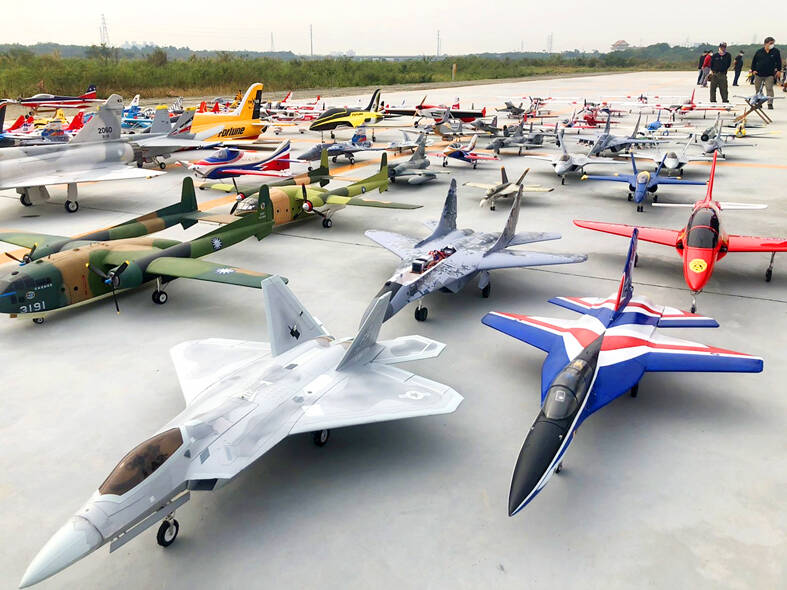The Executive Yuan plans to tighten cybersecurity regulations governing civilian drones, including a mandate for comprehensive testing of all commercially available models, an official said yesterday on condition of anonymity.
Former premier Su Tseng-chang (蘇貞昌) asked the Cabinet to produce new regulations targeting privately owned drones following reports that some Chinese-made systems were utilized during Double Ten National Day performances last year, the person said.
The rules being considered would require all drones sold on the commercial market to obtain cybersecurity certificates, and would ban the use of uncertified uncrewed aerial vehicles (UAVs), the official said.

Photo: Lo Hsin-chen, Taipei Times
The use of uncertified drones could become punishable by a fine of up to NT$1.5 million (US$49,774) under the Civil Aviation Act (民用航空法), the person said.
Taiwan has 40,000 privately owned UAVs, including 30,000 drones registered to individuals and 10,000 to commercial entities, foundations and groups, the official said.
Chinese-made UAVs are banned for official use in Taiwan, but no restrictions are placed on private use, other than a safety rules limiting their weight and flight range.
The scheme being designed aims to regulate the private ownership and utilization of drones by establishing comprehensive standards for cybersecurity, flight safety, license verification, radio signal broadcast authorization and background checks on the users, the person said.
The certification system would be jointly managed by the Ministry of Digital Affairs, the Ministry of Economic Affairs, the National Communications Commission and the Civil Aviation Administration, which is tasked with creating and managing a drone database, the official said.
The aviation authority is expected to hold a public forum to discuss the matter within the next few weeks, then unveil regulatory amendments next month and have them promulgated in April, the person said.
Meanwhile, the Ministry of Digital Affairs plans to open a drone cybersecurity inspection facility on March 1 to test the estimated 1,000 types of drones being used in Taiwan before the year’s end, the official said.
The ministry plans to introduce restrictions on privately owned UAVs to protect public safety, national secrets at sensitive sites, air traffic and the security of officials, the person said, adding that a sunset clause would protect existing drones that do not meet the proposed new standards.

INVESTIGATION: The case is the latest instance of a DPP figure being implicated in an espionage network accused of allegedly leaking information to Chinese intelligence Democratic Progressive Party (DPP) member Ho Jen-chieh (何仁傑) was detained and held incommunicado yesterday on suspicion of spying for China during his tenure as assistant to then-minister of foreign affairs Joseph Wu (吳釗燮). The Taipei District Prosecutors’ Office said Ho was implicated during its investigation into alleged spying activities by former Presidential Office consultant Wu Shang-yu (吳尚雨). Prosecutors said there is reason to believe Ho breached the National Security Act (國家安全法) by leaking classified Ministry of Foreign Affairs information to Chinese intelligence. Following interrogation, prosecutors petitioned the Taipei District Court to detain Ho, citing concerns over potential collusion or tampering of evidence. The

Seventy percent of middle and elementary schools now conduct English classes entirely in English, the Ministry of Education said, as it encourages schools nationwide to adopt this practice Minister of Education (MOE) Cheng Ying-yao (鄭英耀) is scheduled to present a report on the government’s bilingual education policy to the Legislative Yuan’s Education and Culture Committee today. The report would outline strategies aimed at expanding access to education, reducing regional disparities and improving talent cultivation. Implementation of bilingual education policies has varied across local governments, occasionally drawing public criticism. For example, some schools have required teachers of non-English subjects to pass English proficiency

‘FORM OF PROTEST’: The German Institute Taipei said it was ‘shocked’ to see Nazi symbolism used in connection with political aims as it condemned the incident Sung Chien-liang (宋建樑), who led efforts to recall Democratic Progressive Party (DPP) Legislator Lee Kun-cheng (李坤城), was released on bail of NT$80,000 yesterday amid an outcry over a Nazi armband he wore to questioning the night before. Sung arrived at the New Taipei City District Prosecutors’ Office for questioning in a recall petition forgery case on Tuesday night wearing a red armband bearing a swastika, carrying a copy of Adolf Hitler’s Mein Kampf and giving a Nazi salute. Sung left the building at 1:15am without the armband and apparently covering the book with a coat. This is a serious international scandal and Chinese

NEGOTIATIONS: The US response to the countermeasures and plans Taiwan presented has been positive, including boosting procurement and investment, the president said Taiwan is included in the first group for trade negotiations with the US, President William Lai (賴清德) said yesterday, as he seeks to shield Taiwanese exporters from a 32 percent tariff. In Washington, US Trade Representative Jamieson Greer said in an interview on Fox News on Thursday that he would speak to his Taiwanese and Israeli counterparts yesterday about tariffs after holding a long discussion with the Vietnamese earlier. US President Donald Trump on Wednesday postponed punishing levies on multiple trade partners, including Taiwan, for three months after trillions of US dollars were wiped off global markets. He has maintained a 10 percent